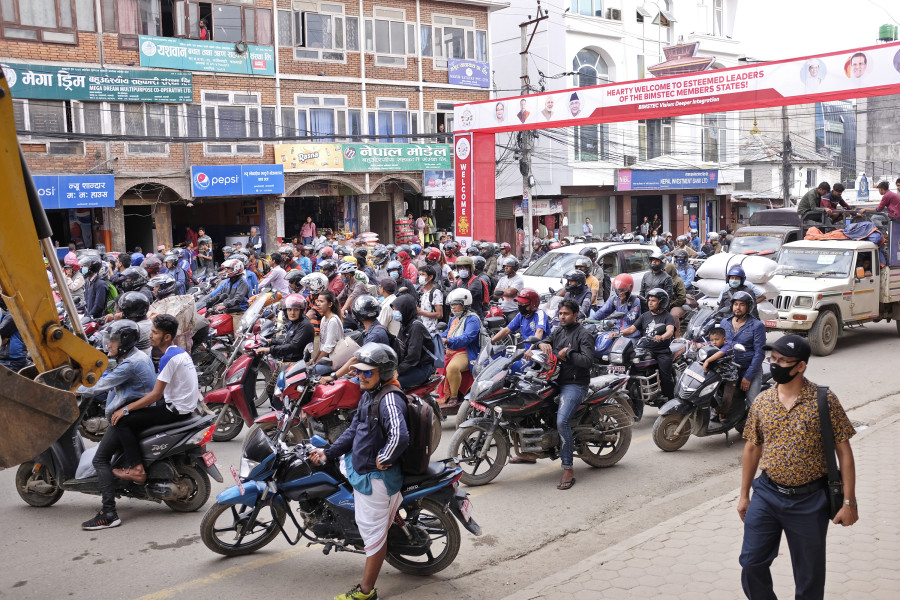Entertainment
Hopping on
For Sushma Giri, getting to the office was always a hassle. She would take the public bus, which never seemed to arrive on time, and a taxi was always too expensive.
Krishana Prasain
For Sushma Giri, getting to the office was always a hassle. She would take the public bus, which never seemed to arrive on time, and a taxi was always too expensive. Then, through social media, she learned of Tootle, a ride-sharing service that instantaneously solved all her transport woes. She called for a ride through the Tootle app and in a few minutes, a motorbike picked her up from her home and then dropped her off to the office. And at a fraction of the price of a taxi.
Tootle, a ‘collaborative consumption’ platform that started more than a year ago, came at just the right time—passengers need rides but buses and microbuses are either too crowded or unavailable and taxis charge rates that amount to extortion. In the short while that it has been in the market, it has become a successful company that has efficiently capitalised on the ‘sharing economy’ that is currently taking the world by storm. Along with providing passengers with a much-needed ride at affordable rates, it has also opened up avenues of employment for many freelance workers. In doing so, it, along with a few similar companies, have set in motion what could be Nepal’s very own gig economy, a labour market characterised by short-term freelance work.
Why it works
The reason behind Tootle’s success so far has a lot to do with its ability to provide customers the perfect combination of affordability and convenience. “One day, I was getting late for the office so I decided to use Tootle. Usually when I take a taxi from my house to the office, it costs me around Rs 600, but with Tootle, I only paid Rs 200, which is quite affordable,” said Giri. Since then, Giri has used Tootle more than 30 times. The ride-sharing’s easy accessibility, affordability and convenience has brought in thousands of commuters like Giri into Tootle’s fold. With success comes competition and Pathao, another ride-sharing platform based out of Bangladesh, has now entered the market, hoping to capitalise on the growing popularity and need for ride-sharing services.
“We thought of starting a ride-sharing service to fill in the huge gaps that are there in Kathmandu’s transportation sector,” said Asheem Man Singh Basnyat, director at Pathao in Nepal.
Along with being a service provider, such platforms are providing service-givers the perfect platform to get some extra cash.
Rajesh Thakur, a full-time rider, has been working at Pathao, which entered Nepal two months ago, ever since it started and earns a minimum of Rs 35,000 a month, taking on 15-20 riders a day. Like Thakur, there are many other riders working as part-time or full-time riders at Pathao.
“Tootle riders are earning up to Rs 60,000-70,000 per month and we have been able to create employment opportunity to many people,” said Sixit Bhatta, co-founder and CEO of Tootle. “And many riders are interested to work in the company.”
The potential of these companies
The number of vehicles on the streets of Kathmandu are almost twice the demand for transport, especially given the exponential rise of motorbikes and cars. Now that these two ride-sharing apps are bridging that gap, it appears that there is a growing demand for affordable transport.
“We do an average of 3,000-3,500 trips per day,” said Shashank Shumsher Thapa, assistant human resource manager at Pathao. “The total number of app downloads have reached 75,000, which includes both customer and rider downloads.”
According to a survey conducted by Pathao, there is one bike for every five people in Kathmandu, and that one person covers a distance of 20-30 kilometres daily. The survey also showed that bikes in Kathmandu run for hardly two hours a day and lie useless for the rest of the day. This data means that a lot more ride-sharers could come on board and be a part of the economy, which will push the market demand even further.
Other benefits
According to Thapa, there are almost one million bikes in Kathmandu, and he believes that if just one bike would carry two people, instead of just the rider, then many of the city’s traffic woes would decrease by 15 to 20 percent.
“Tootle is not a just ride-sharing company, the whole idea revolves around encouraging freedom of movement,” said Bhatta. In Kathmandu, public transportation is a hassle for differently-abled people and women. Which is why, platforms like Tootle have been specifically designed to accommodate women and the physically disabled.
For instance, more than 100 visually impaired people use Tootle, said Bhatta, because the app has been developed keeping in mind the visually impaired. Similarly, the platform also ensures riders their safety, as they provide orientation and training to riders as well.
At Pathao, the story is similar. “We ensure the safety of our customers as we are always prepared with a quick response team. We are providing the safest mode of transportation in Nepal as we are monitoring all rides one by one,” said Basnyat.
Tootle also encourages female participation by actively seeking out female service-seekers. “We think that mobility should be inclusive for everyone and that makes us different from others,” said Bhatta.
The future for such companies
The nascent gig economy in Nepal is only just developing, which means if done right, it could reap massive rewards. “In Nepal, there is tremendous potential to not just enhance the performance of our work but also create a revolutionary product,” said Bhatta.
In Tootle alone, there are more than 10,000 riders who provide ride-sharing services, according to the company. “We have our own payment system and we charge on a per kilometre basis,” said Bhatta. “But our prices are dynamic, they vary based on demand and supply.”
Tootle currently only provides services in the Kathmandu Valley and is planning to expand to Pokhara and Chitwan very soon. Pathao too plans to provide other logistics services soon. Like Tootle and Pathao, Sarathi, a cab-booking online service provider, is also planning to introduce ride-sharing services for its cabs from January 15, said Ravi Singhal, co-founder at Sarathi.
To make things easier for customers, Pathao is also planning to tie up with a digital payment platform soon. The company currently charges Rs 30 as base rate and Rs 15 per kilometer, and rolled out providing discounts of Rs 75 for the first 10 rides. As a new entrant in the market, Pathao is aggressively pushing into cultivating both a customer and a service-provider base, by giving away discount and promo codes for the former and higher compensation rates for the latter.
“We are into the mobility business and it’s very important to empower people by giving them economic opportunities,” said Bhatta. “Mobility helps.”




 24.09°C Kathmandu
24.09°C Kathmandu




.jpg&w=200&height=120)





